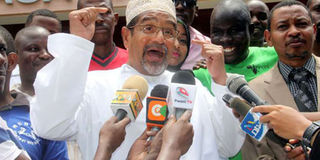Security forces worldwide seem to have a deal on how to treat terror suspects

Muslims for Human Rights (Muhuri) Director Khelef Khalif addresses journalists outside Mombasa Law Court after it ruled that the State's order to freeze the group's bank accounts be lifted, on November 12, 2015. Muhuri has in the past been confronted by claims of links to terrorism. PHOTO | LABAN WALLOGA | NATION MEDIA GROUP
What you need to know:
- After three weeks, she eventually learnt that Maher had been renditioned to Syria after the Syrian regime claimed he was a member of a Syrian terrorist cell even though he had not set foot in Syria for 17 years!
- Unknown to Maher or the friend, this friend was under surveillance and the Canadian intelligence duly noted the meeting and started a file on Maher.
- Monia has written a book about these experiences, entitled Hope and Despair: My struggle to free my husband Maher Arar.
This past December, I met Monia Mazigh, a strong Tunisian-born Canadian woman whose husband, Maher Arar, was handed over to Syria by the USA to on September 2002 on suspicion of terrorism.
Their story is a cruel reminder of how security forces across the world are bound together by a sense of unchecked power, impunity, and an inability to accept their mistakes.
It is a story on how the war on terror has further emboldened security forces to do as they wish, oblivious of the pain and suffering they cause to ordinary innocent people across the world.
With the false and malicious efforts to link Muslims for Human Rights (Muhuri) with terrorism saga fresh on my mind, Monia’s story resonated strongly with me.
Maher was born in Syria but had migrated with his family to Canada in the mid-1980s to escape the brutal Assad regime.
He trained as a telecommunications engineer and was soon working for a US company travelling the world for his job.
He set up his own company and was living the Canadian dream, especially after he married Monia and had two kids.
In September 2002, Maher left his wife and kids on holiday in Tunis to return to work early, flying to Montreal via New York City.
He was supposed to contact Monia on arrival in Canada but she did not hear from him as scheduled and after a couple of days she started calling everyone she knew in Canada asking after him.
Five days later, Monia learnt that Maher was in a prison in the New York City area.
After another two days, Monia was told that Maher was being held on suspicion of being a member of Al Qaeda.
RALLYING SUPPORT
Still in shock and full of worry, six days later, Monia learnt that Maher was no longer in the prison.
After three weeks, she eventually learnt that Maher had been renditioned to Syria after the Syrian regime claimed he was a member of a Syrian terrorist cell even though he had not set foot in Syria for 17 years!
In these first years after September 11, 2001, the US was outsourcing torture to some of the most brutal regimes in the world.
Pariah regimes were bending over backwards to accommodate the Americans by doing their torturing for them, at a time when the USA was the undisputed sole Super Power.
Over the next year Monia, her PhD in Finance notwithstanding, dropped everything to concentrate on campaigning to get her husband back from Syria.
She activated the Canadian diplomatic system which was granted access to Maher in Syria every once in a while.
She also activated the human rights groups in Canada, including Amnesty Canada, as well as women rights groups and leaders, and also politicians.
Monia soon discovered that while quiet diplomacy had its uses, media and public campaigns were indispensable even though the diplomatic and security establishment in Canada frowned on them.
After several run-arounds by Canadian security services, Monia was later told that Maher’s “crime” was meeting an old friend for coffee in early 2002.
UNJUSTIFIED ACTIONS
Unknown to Maher or the friend, this friend was under surveillance and the Canadian intelligence duly noted the meeting and started a file on Maher.
They then “shared” this file with US security forces which triggered the arrest at JFK airport in September 2002.
Maher was eventually released without charge and returned to Canada, where a commission of inquiry in Canada absolved him.
But he was badly tortured in Syria leaving psychological scars that have still not fully healed.
Worse was the whispering by the intelligence services after his release, quoting Syrian sources, which tried to justify his arrest and detention on account of “confessions” he made while in Syrian custody.
Monia has written a book about these experiences, entitled Hope and Despair: My struggle to free my husband Maher Arar.
It is an inspirational book, depicting courage, determination, and resolve.
But it is also an indictment on security forces which treated Maher, Monia and their family as simple collateral damage, much like the Uhuruto regime treated Muhuri.
Maina Kiai is a former Chair of the Kenya National Commission on Human Rights. [email protected]





